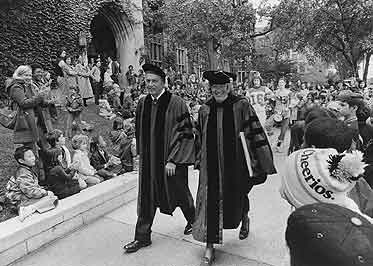 From
Our Pages
From
Our Pages
1912
In response to requests from city officials the University
instituted fire drills at Cobb Hall. Faculty members led
students out of the building while Chicago fire marshals
were “situated at the head of the stairs on each floor...to
urge on recalcitrant instructors and to inform them of certain
finer details of the evolutions.” The first drill,
on November 27, showed that the building could be evacuated
in three minutes.
1952 Physics
professor Samuel K. Allison, SB’21, PhD’23,
contributed “Ten Years of the Atomic Age: Thoughts
on the Tenth Anniversary of the Chain Reaction” to
the Magazine. Transferred to Los Alamos to work on the Manhattan
Project, Allison returned to Chicago after World War II
as director of the Institute for Nuclear Studies (now the
Enrico Fermi Institute). Following the creation and use
of nuclear weapons and energy, Allison wrote, “there
was a long-range anxiety, namely that humanity might not
be sufficiently advanced in ethical and moral sense to make
good instead of bad use of the new powers.” He hoped
that research universities, and especially Chicago, would
pursue peaceful uses for the newly harnessed atomic energy.

1977 On
December 10 board of trustees chair Robert W. Reneker, PhB’34,
announced the election of the University’s tenth president:
“It is a joy to know that Hanna Gray will be returning
to the University [from Yale],” Reneker said. “She
has a splendid reputation as a scholar; she knows this University
and enjoys the confidence of its faculty.” Taking
office on July 1, 1978, after serving as Yale’s provost
and acting president, Hanna Holborn Gray, Chicago’s
chief executive until 1993, is now the Harry Judson Pratt
distinguished service professor emeritus of history.
1992 In
the early 1990s the question surrounding the annual announcement
of the Nobel Prize in Economic Sciences was not if a Chicago
economist would win, but rather which would win. The answer
in 1992 was Gary Becker, AM’53, PhD’55, the
third Chicagoan in a row. His work analyzing discrimination,
marriage, and drug abuse—more typically the domain
of sociologists than economists—using microeconomic
principles earned him the prize. Becker, the Nobel committee
noted, “borrowed an aphorism from Bernard Shaw to
describe his methodological philosophy: ‘Economy is
the art of making the most of life.’ ”
— E.H.


![]() Contact
Contact
![]() About
the Magazine
About
the Magazine ![]() Alumni
Gateway
Alumni
Gateway ![]() Alumni
Directory
Alumni
Directory ![]() UChicago
UChicago![]() ©2002 The University
of Chicago® Magazine
©2002 The University
of Chicago® Magazine ![]() 5801 South Ellis Ave., Chicago, IL 60637
5801 South Ellis Ave., Chicago, IL 60637![]() fax: 773/702-0495
fax: 773/702-0495 ![]() uchicago-magazine@uchicago.edu
uchicago-magazine@uchicago.edu
